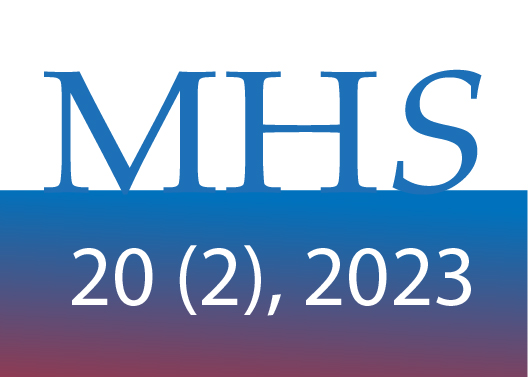Barriers and incentives for mobility in a bike-sharing system in a Spanish municipality
DOI:
https://doi.org/10.15359/mhs.20-2.6Keywords:
bicycle, public health, promotion health, physical activityAbstract
Introduction: Interest in urban cycling is increasing and the number of shared bike programs has grown rapidly in recent years. Therefore, the objective that is intended to be achieved in this study is to know if factors such as seasons, routes and altitudes affect the use of the shared bicycle system in a Spanish municipality.
Methods: A quantitative and longitudinal study has been designed with the collection and analysis of data from the BSS of Vilagarcía de Arousa, registering a total of 84,183 observations (men n = 59,159; women n = 25,024). The data extracted from the system was collected and statistically analyzed through the IBM SPSS version 21.0 program. A significance value of p < 0.05 has been established.
Results: The most used station was the one located in the center of the city, representing a total of 39% of the observations. The neutral elevation, that is, leaving a station and depositing the bicycle in another with the same altitude, represented 65.5% of the total records.
Conclusions: The municipality of Vilagarcía de Arousa has some favorable topographical characteristics to be a profitable service that promotes healthy habits as a means of active transportation in the urban environment, as well as an improvement in urban mobility and a less polluted environment.
References
Beenackers, M. A., Foster, S., Kamphuis, C., Titze, S., Divitini, M., Knuiman, M., van Lenthe, F. J. y Giles-Corti, B. (2012). Taking up cycling after residential relocation: built environment factors. American Journal of Preventive Medicine, 42(6), 610-615. https://doi.org/10.1016/j.amepre.2012.02.021
Bauman, A., Crane, M., Drayton, B. A. y Titze, S. (2017). The unrealised potential of bike share schemes to influence population physical activity levels–A narrative review. Preventive Medicine, 103, S7-S14. https://doi.org/10.1016/j.ypmed.2017.02.015
Beairsto, J., Tian, Y., Zheng, L., Zhao, Q. y Hong, J. (2022). Identifying locations for new bike-sharing stations in Glasgow: an analysis of spatial equity and demand factors. Annals of GIS, 28(2), 111-126. https://doi.org/10.1080/19475683.2021.1936172
Buck, D. y Buehler, R. (22-26 de enero de 2012). Bike lanes and other determinants of capital bikeshare trips. In Proceedings of the Transportation Research Board 91st Annual Meeting, Washington, DC, USA. https://nacto.org/wp-content/uploads/2012/02/Bike-Lanes-and-Other-Determinants-of-Capital-Bikeshare-Trips-Buck-et-al-12-3539.pdf
Chen, Z., van Lierop, D. y Ettema, D. (2020). Dockless bike-sharing systems: what are the implications?. Transport Reviews, 40(3), 333-353. https://doi.org/10.1080/01441647.2019.1710306
Clockston, R. L. M. y Rojas-Rueda, D. (2021). Health impacts of bike-sharing systems in the US. Environmental Research, 202, 111709. https://doi.org/10.1016/j.envres.2021.111709
Contardo, C., Morency, C. y Rousseau, L. M. (2012). Balancing a dynamic public bike-sharing system. CIRRELT.
Dekoster, J. y Schollaert, U. (2000). En bici, hacia ciudades sin malos humos. Oficina de Publicaciones Oficiales de las Comunidades Europeas.
DeMaio, P. (2009). Bike-sharing: History, impacts, models of provision, and future. Journal of Public Transportation, 12(4), 41-56. https://doi.org/10.5038/2375-0901.12.4.3
Eren, E. y Uz, V. E. (2020). A review on bike-sharing: The factors affecting bike-sharing demand. Sustainable Cities and Society, 54, 101882. https://doi.org/10.1016/j.scs.2019.101882
Faghih-Imani, A., Hampshire, R., Marla, L. y Eluru, N. (2017). An empirical analysis of bike sharing usage and rebalancing: Evidence from Barcelona and Seville. Transportation Research Part A: Policy and Practice, 97, 177-191. https://doi.org/10.1016/j.tra.2016.12.007
Garrard, J., Rose, G. y Lo, S. K. (2008). Promoting transportation cycling for women. The role of bicycle infrastructure. Preventive Medicine, 46, 55-59. https://doi.org/10.1016/j.ypmed.2007.07.010
Hu, B., Zhong, Z., Zhang, Y., Sun, Y., Jiang, L., Dong, X. y Sun, H. (2022). Understanding the influencing factors of bicycle-sharing demand based on residents’ trips. Physica A: Statistical Mechanics and its Applications, 586, 126472. https://doi.org/10.1016/j.physa.2021.126472
Hunt, J. D. y Abraham, J. E. (2007). Influences on bicycle use. Transportation, 34(4), 453-470. https://doi.org/10.1007/s11116-006-9109-1
Julio, R. y Monzon, A. (2022). Long term assessment of a successful e-bike-sharing system. Key drivers and impact on travel behaviour. Case Studies on Transport Policy, 10(2), 1299-1313. https://doi.org/10.1016/j.cstp.2022.04.019
Lee, M., Hwang, S., Park, Y. y Choi, B. (2022). Factors affecting bike-sharing system demand by inferred trip purpose: Integration of clustering of travel patterns and geospatial data analysis. International Journal of Sustainable Transportation, 16(9), 847-860. https://doi.org/10.1080/15568318.2021.1943076
Lu, W., Scott, D. M. y Dalumpines, R. (2018). Understanding bike share cyclist route choice using GPS data: Comparing dominant routes and shortest paths. Journal of Transport Geography, 71, 172-181. https://doi.org/10.1016/j.jtrangeo.2018.07.012
Ma, X., Yuan, Y., Van Oort, N. y Hoogendoorn, S. (2020). Bike-sharing systems’ impact on modal shift: A case study in Delft, the Netherlands. Journal of Cleaner Production, 259, 120846. https://doi.org/10.1016/j.jclepro.2020.120846
Macioszek, E., Świerk, P. y Kurek, A. (2020). The bike-sharing system as an element of enhancing sustainable mobility - A case study based on a city in Poland. Sustainability, 12(8), 3285. https://doi.org/10.3390/su12083285
Mateo-Babiano, I., Bean, R., Corcoran, J. y Pojani, D. (2016). How does our natural and built environment affect the use of bicycle sharing? Transportation Research Part A: Policy and Practice, 94, 295-307. https://doi.org/10.1016/j.tra.2016.09.015
Menghini, G., Carrasco, N., Schüssler, N. y Axhausen, K. W. (2010). Route choice of cyclists in Zurich. Transportation Research Part A: Policy and Practice, 44(9), 754-765. https://doi.org/10.1016/j.tra.2010.07.008
Midgley, P. (2009). The role of smart bike-sharing systems in urban mobility. Journeys, 2, 23-31. https://www.gtkp.com/assets/uploads/20091127-144837-7443-IS02-p23%20Bike-sharing.pdf
Mix, R., Hurtubia, R. y Raveau, S. (2022). Optimal location of bike-sharing stations: A built environment and accessibility approach. Transportation Research Part A: Policy and Practice, 160, 126-142. https://doi.org/10.1016/j.tra.2022.03.022
Munkácsy, A. y Monzón, A. (2017). Potential user profiles of innovative bike-sharing systems: the case of BiciMAD (Madrid, Spain). Asian Transport Studies, 4(3), 621-638. https://doi.org/10.11175/eastsats.4.621
Nieuwenhuijsen, M. J. y Rojas-Rueda, D. (2020). Bike-sharing systems and health (In) MJ, Nieuwenhuijsen and H, Khreis, Advances in Transportation and Health (239-250). Elsevier. https://doi.org/10.1016/B978-0-12-819136-1.00010-3
Ogilvie, F. y Goodman, A. (2012). Inequalities in usage of a public bicycle sharing scheme: Socio-demographic predictors of uptake and usage of the London (UK) cycle hire scheme. Preventive Medicine, 55(1), 40-45. https://doi.org/10.1016/j.ypmed.2012.05.002
Otero, I., Nieuwenhuijsen, M. J. y Rojas-Rueda, D. (2018). Health impacts of bike sharing systems in Europe. Environment International, 115, 387-394. https://doi.org/10.1016/j.envint.2018.04.014
Pucher, J., Buehler, R. y Seinen, M. (2011). Bicycling renaissance in North America? An update and re-appraisal of cycling trends and policies. Transportation Research Part A: Policy and Practice, 45(6), 451-475. https://doi.org/10.1016/j.tra.2011.03.001
Pucher, J., Garrard, J. y Greaves, S. (2011). Cycling down under: a comparative analysis of bicycling trends and policies in Sydney and Melbourne. Journal of Transport Geography, 19(2), 332-345. https://doi.org/10.1016/j.jtrangeo.2010.02.007
Pucher, J., Komanoff, C. y Schimek, P. (1999). Bicycling renaissance in North America? Recent trends and alternative policies to promote bicycling. Transportation Research Part A: Policy and Practice, 33(7), 625-654. https://doi.org/10.1016/S0965-8564(99)00010-5
Rietveld, P. y Daniel, V. (2004). Determinants of bicycle use: Do municipal policies matter? Transportation Research Part A: Policy and Practice, 38(7), 531-550. https://doi.org/10.1016/j.tra.2004.05.003
Rixey, R. A. (2013). Station-level forecasting of bikesharing ridership: Station network effects in three US systems. Transportation research record, 2387(1), 46-55. https://doi.org/10.3141/2387-06
Sanmiguel-Rodríguez, A. (2015). Ambiente urbano y bicicletas compartidas: efectos sobre la actividad física [tesis doctoral]. Universidade de Vigo. http://www.investigo.biblioteca.uvigo.es/xmlui/handle/11093/381
Sanmiguel-Rodríguez, A. (2019). Análisis de las edades, trayectos y minutos de uso en la utilización de un sistema de bicicletas compartidas: el caso del VaiBike en Vilagarcía de Arousa (España). Retos: Nuevas Tendencias en Educación Física, Deporte y Recreación, 35, 314-319. https://doi.org/10.47197/retos.v0i35.66470
Sanmiguel-Rodríguez, A. (2020). Cumplimiento de las recomendaciones de actividad física de la OMS por usuarios de bicicletas públicas en un municipio español. Revista Habanera de Ciencias Médicas, 19(3) e2955. http://www.revhabanera.sld.cu/index.php/rhab/article/view/2955
Sanmiguel-Rodríguez, A. (2022). Bike-sharing systems: Effects on physical activity in a Spanish municipality. Physical Activity Review, 10(2), 66-76. https://doi.org/10.16926/par.2022.10.22
Sanmiguel-Rodríguez, A. y Arufe Giráldez, V. (2019). Impact of climate on a bike-sharing system. Minutes of use depending on day of the week, month and season of the year. Cuadernos de Psicología del Deporte, 19(2), 102-112. https://doi.org/10.6018/cpd.338441
Scheiner, J. (2010). Interrelations between travel mode choice and trip distance: trends in Germany 1976-2002. Journal of Transport Geography, 18(1), 75-84. https://doi.org/10.1016/j.jtrangeo.2009.01.001
Soriguera, F. y Jiménez-Meroño, E. (2020). A continuous approximation model for the optimal design of public bike-sharing systems. Sustainable Cities and Society, 52, 101826. https://doi.org/10.1016/j.scs.2019.101826
Sun, F., Chen, P. y Jiao, J. (2018). Promoting public bike-sharing: A lesson from the unsuccessful Pronto system. Transportation Research Part D: Transport and Environment, 63, 533-547. https://doi.org/10.1016/j.trd.2018.06.021
Talavera-García, R., Romanillos, G. y Arias-Molinares, D. (2021). Examining spatio-temporal mobility patterns of bike-sharing systems: the case of BiciMAD (Madrid). Journal of Maps, 17(1), 7-13. https://doi.org/10.1080/17445647.2020.1866697
Tin, S. T., Woodward, A., Robinson, E. y Ameratunga, S. (2012). Temporal, seasonal and weather effects on cycle volume: an ecological study. Environmental Health, 11(12), 1-9. https://doi.org/10.1186/1476-069X-11-12
Unwin, N. C. (1995). Promoting the public health benefits of cycling. Public Health, 109(1), 41-46. https://doi.org/10.1016/S0033-3506(95)80074-3
Vandenbulcke, G., Dujardin, C., Thomas, I., de Geus, B., Degraeuwe, B., Meeusen, R. y Panis,
L. I. (2011). Cycle commuting in Belgium: spatial determinants and ‘re-cycling’ strategies. Transportation Research Part A: Policy and Practice, 45(2), 118-137. https://doi.org/10.1016/j.tra.2010.11.004
Zhang, L., Zhang, J., Duan, Z. Y. y Bryde, D. (2015). Sustainable bike-sharing systems: characteristics and commonalities across cases in urban China. Journal of Cleaner Production, 97, 124-133. https://doi.org/10.1016/j.jclepro.2014.04.006
Published
How to Cite
Issue
Section
License
General conditions
MHSalud: Journal in Human Movement Sciences and Health by the Universidad Nacional is cover under a Creative Commons Atribución-NoComercial-SinDerivadas 3.0 Costa Rica license.
The journal is hosted in open access repositories such as the Institutional Repository of the Universidad Nacional, the Kimuk Repository of Costa Rica and La Referencia.
The editorial source of the journal must be recognized. Use the doi identifier for this purpose.
Self-archiving policy: The journal allows the self-archiving of the articles in their peer-reviewed version, edited and approved by the Editorial Board of the Journal to be available in Open Access through the Internet. More information in the following link: https://v2.sherpa.ac.uk/id/publication/25815



















